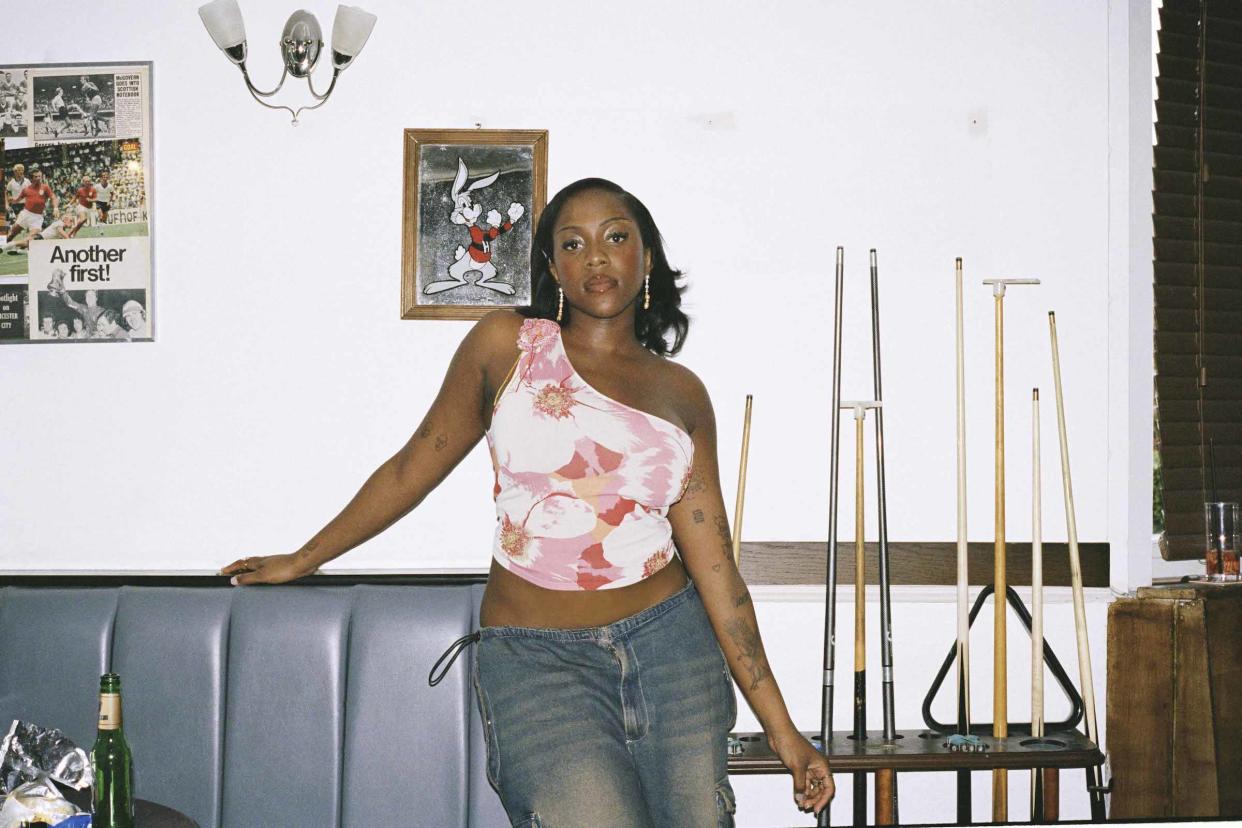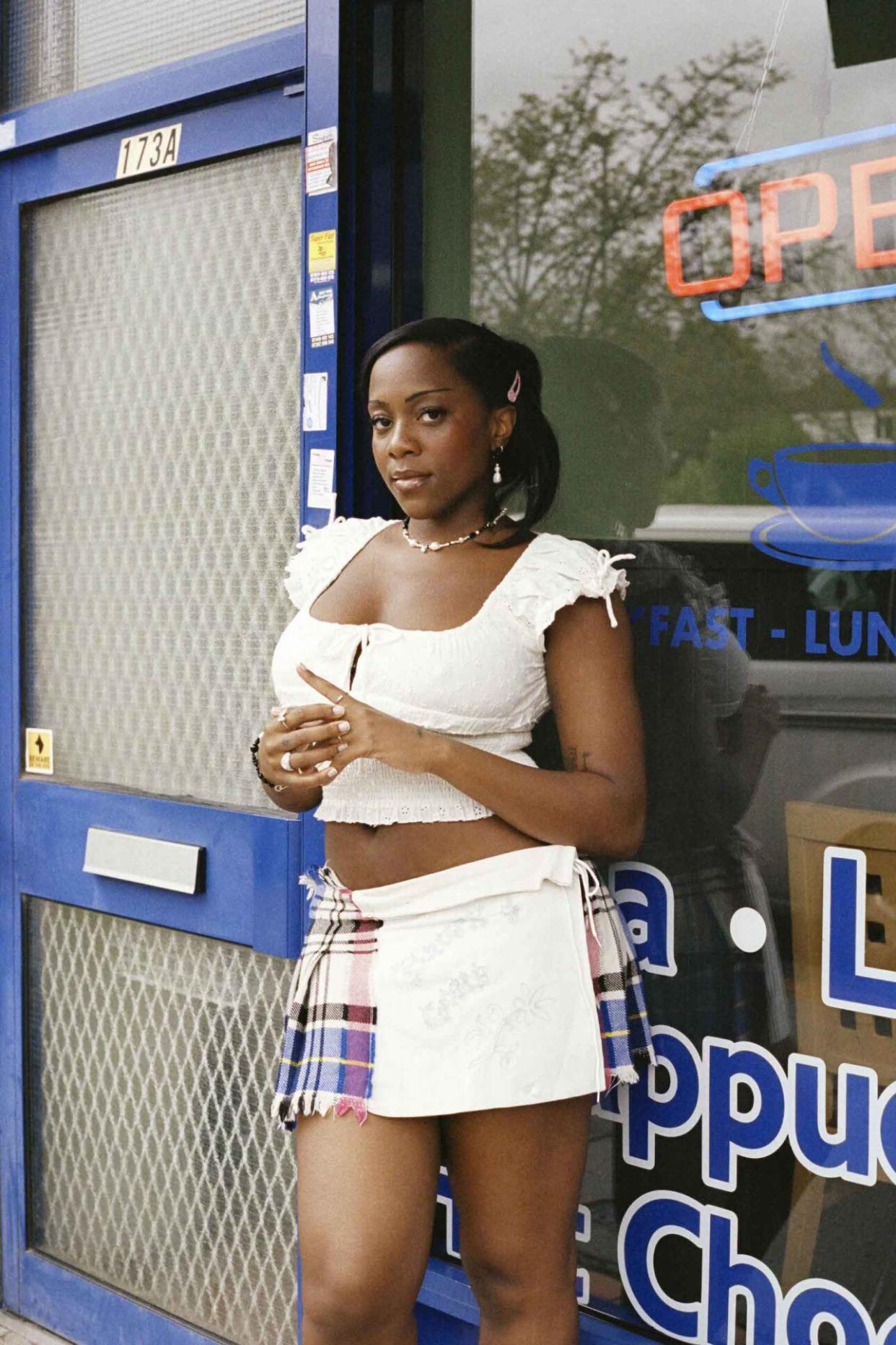Rachel Chinouriri’s ‘English Soundscape’


Music nostalgia is a beautifully complicated feeling. And it’s one that Rachel Chinouriri is skilled at harnessing in her music. The London-born Zimbabwean musician’s debut album, What A Devastating Turn of Events, is charged with that coming-of-age feeling where daily life’s only remedy is blasting noise with the bedroom door slammed shut to the outside world.
More from Spin:
“I think this album feels really nostalgic, and feels like the songs that I heard in my childhood,” says the indie rock musician, Zooming in from her home in Hackney. Chinouriri is talking about more than superficial nostalgia. These are more than just songs remembered from the radio as a teenager; they’re amber, trapping the insects of familial trauma or overbearingly hormone-perfumed memories in a stunning resin. “What things in my childhood do I remember poignantly in music that felt nostalgic, but kind of made me the person I was?” she continues, snacking on some crisps in a cozy black sweatshirt. Coldplay’s “Politik” and Kings of Leon’s heavy guitars come to her mind.

As a baby of the late ‘90s, her nods to alt-pop and indie rock of the early aughts are clear. Chinouriri’s music is a collage of the empathic, sentimental rock music championed by the likes of Coldplay, Goo Goo Dolls, Lifehouse, and Snow Patrol, with hints of the witty, direct pop from Kate Nash and Lily Allen. “I want the album to be a bit of an English soundscape,” she says. “We’ve got like British DJs on there, and my British friends, and then my voice and then all the things which feel nostalgic to being raised in the U.K.”
She even expresses that the album art is intended to make “you feel like you grew up in the U.K., no matter who you are, where you’re from.” She notes that the choice to use the St. George’s flag instead of the Union Jack was necessary to the album’s concept. “There’s always a celebratory thing with the U.K. with street parties, with flag banners everywhere. But as a Black person, you never really want to walk down those streets because the England flag and Black people definitely don’t mix.”
She adds, “Unless you’re doing football, sports, the Olympics—that’s suddenly when Black people are really celebrated. And you’ll see Black and POC people with flags on the street. Any other day it wouldn’t really happen. This album is kind of a celebration of my homecoming and me realizing that London and the U.K. is my home. I’m going to wave the flag whether they like it or not because I’ve only got an English passport as well.”

Her debut is padded with sizzling electric guitars, anxiously sulking bass, and melodies that sprawl like a blown dandelion. It’s a dynamic rock-pop album filled with everything from stadium-worthy guitar anthems (“The Hills”) to whistle-pop that rivels Peter Bjorn and John (“It Is What It Is”) to acoustic indie ballads bittersweet like snug rainy weather (“Pockets”). But this wasn’t always the case. She reveals there was a whole other album ready for release in 2020. And, now, she’s grateful for the redirection.
“I don’t think I would have been happy for my other album to be the first album,” she says. She won’t be revisiting the scrapped project, which she compares to her EP Four° In Winter, anytime soon. “I sound really young and not confident in those songs. And I think I’m really confident in who I am now as an artist,” she says. “I don’t want to say that this album is ‘woe is me’ but this is the trauma-dump kind of vibe. The place I’ve been in mentally now is way different and a better place. The music I have should represent that place, essentially.”
What A Devastating Turn of Events is a disarmingly raw introduction that wrestles with the melancholy of understanding one’s home. Growing up the daughter of Zimbabwe immigrants— and the youngest of five, with an age gap between four and 14 years—Chinouriri wasn’t allowed to listen to non-Christian music. But she and her siblings would indulge in Channel U and MTV when her parents weren’t home. “[My mom] also worked something silly like 70 or 80 hours to get a deposit on our house. So she was never home. Then my dad was always with her because he got sick near that time.” Chinouriri describes her battle between being on edge with her household’s strictness and the outside world’s racist, unsafe, and scary reality.
She felt a sort of relief when leaving home around 19. But then her parents got stuck in Zimbabwe during a trip amidst the pandemic and weren’t able to return for a while. Something shifted: “I had an element of wanting to go back home. And I knew that was my home. But there’s something about it I miss even though it was really traumatic.”

Chinouriri’s music holds this tension, of loving and wanting something that isn’t devoid of pain, close. The album’s lead single, “The Hills,” inspired by a miserable time she experienced living in L.A, is a pivotal moment where she captures the notion of “home” as a feeling simultaneously innate, inescapable, and phantasmic. “Have you ever noticed that your house don’t feel like home?” she asks in a silky high register. “In a room that you’ve outgrown scrubbing at the writing on the walls.”
Her lyrics embrace home while also mourning a romanticized version of it. “I think it replicates the album in the sense of, I was missing home, which was my family home,” she says of “Garden of Eden,” the album’s opening track. “I even tried to see if I could buy my family home. That’s how much I missed it. But then I was like, I can never go back to that place. I can never, because even if I do, it won’t be the house with all my siblings growing up through their teen years. Everyone is in their own thing—it’s never going to be the same energy, the same feeling. It’s never going to be that again.” The song’s chorus is sly. If you weren’t paying very close attention you might hear: “The kids are growing up in the garden.” But that’s not the case.
“I’m actually saying the kids are throwing up in the garden,” she clarifies. Even when she’s performed it live, people don’t realize it’s not a happy chorus. “If you actually look at what’s happening, this is a terrible situation. We’re not here for a good ride currently. I wanted ‘Garden of Eden’ to almost give a sense of how it was like growing up. I wrote it in the British countryside, which I think it sounds like at the very beginning. And I grew up in basically the British countryside to some degree in Croydon. So I think it really sets the tone of my album, but also maybe my upbringing of what it was like in my house.”
During our brief chat, it’s clear that leaning into discomfort is important to Chinouriri’s work—and integral to understanding who she is. I’m curious if there’s a tension between her artistic vulnerability and her shyness that’s been hinted at in interviews (including the story she’s told about her first day at BRIT school,when she burst into tears while performing “Somewhere Over the Rainbow”). “Being a Black artist in music, I haven’t been afforded to be vulnerable, because if I’m quiet or shy, it comes across as you’re rude, probably more so than anyone else,” she says. “Which I realized will not play to my advantage. And I probably realized that quite young.
“Even if I was super embarrassed to do something, I’ll just go and do it anyway, even though I’d be mortified inside. I had to force myself to be an extrovert. And it’s almost played to my advantage to some degree. But it means that my music sounds one way, and then when people meet me, they’re like, ‘Oh, my God, you’re so much like the other way,’ or ‘You’re so extroverted and nice and happy.’ But also, I can’t be the quiet me in this industry, because you don’t want to be perceived in a certain way.”
But she thinks it’s also “good to be uncomfortable.”
“It’s good to be put out of your shell because I feel lucky,” she says. “I’m able to speak to different people and feel confident, versus almost having panic attacks from speaking to people, which is how I used to be.”
Taking stock of the past and understanding how it’s shaped her today—that’s the focal point of What A Devastating Turn of Events. Rachel Chinouriri knows not to cling to the past, but she isn’t forgetting it either.
To see our running list of the top 100 greatest rock stars of all time, click here.
